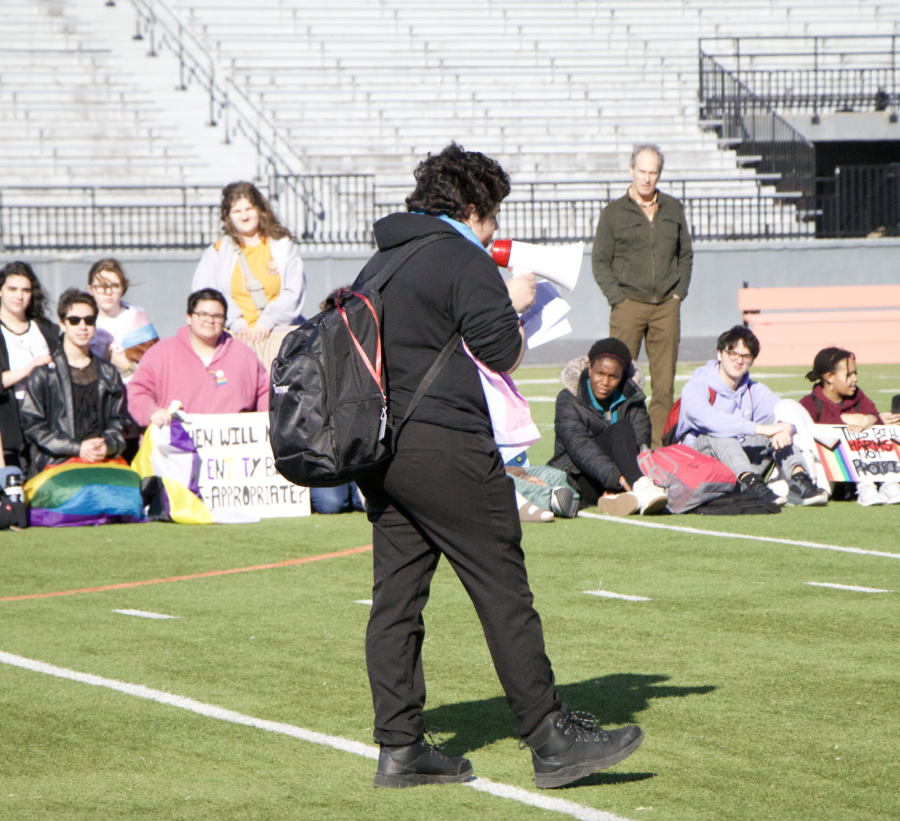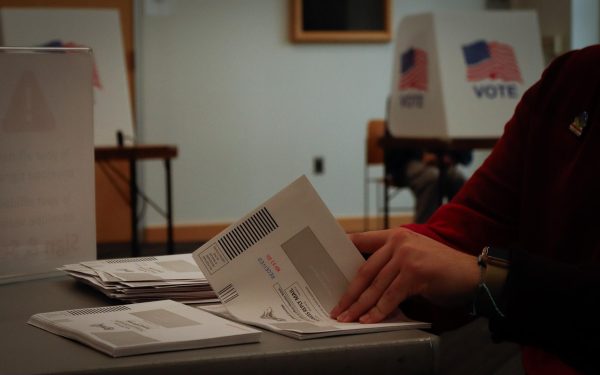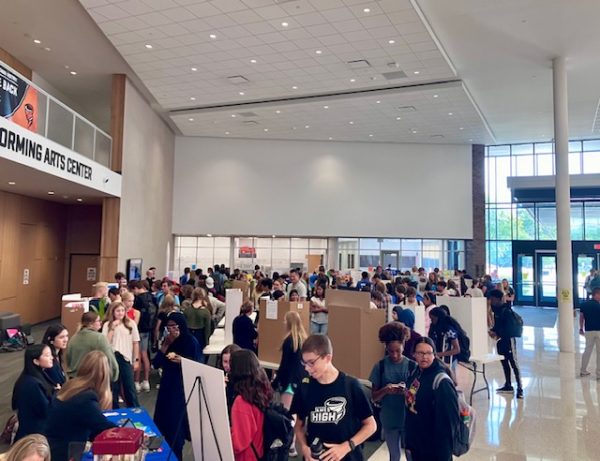AHS SPECTRUM Leader Zack Pinto Shares His Story Among Rising Anti-LGBTQ Iowa Legislation
Senior Zack Pinto speaks to students on the football field during the March 1st Ames High walkout.
Ames High students walked out of classes earlier this month to protest proposed legislation by the Iowa House that poses a threat to LGBTQ rights. So far, Governor Kim Reynolds has signed into law SF 538, banning gender-transition procedures for Iowans under the age of 18, and SF 482, requiring transgender people to only use locker rooms or restrooms that correspond with the sex on their birth certificate. During the protest, Ames High students filed into a circle at the center of the football field, where surrounded by signs calling “We say gay” members of SPECTRUM – the Ames High Gender and Sexuality Alliance – spoke to their own experiences as queer youth. Among them was Zack Pinto ’23, the 2022-23 SPECTRUM leader.
Standing among fellow students, speaking his story loudly and clearly into a megaphone, it may be difficult to believe that Pinto was terrified to give his speech.
Just as it is difficult to believe that only 4 years ago he had never heard the term “transgender”.
Pinto grew up in the small of town of Ilheus, Brazil, 804 miles north of Rio de Janeiro. Although his mother had a gay friend who was married to another man, Pinto says, “It never really clicked for me”. As a conservative town where he “knew everybody on the street”, Ilheus left him sheltered from LGBTQ ideas.
At 14, Pinto would move to the U.S. with his parents. “And I came here to America, and this girl came to me and said that she was bisexual. And I had never heard that word ever in my life. And I was like, What?… I said, ‘No worries, I support you for whatever country you may be from.’ Because that’s what I thought she meant. Because bilingual-bisexuals like ‘Oh, nice, she’s from another country.'”
Pinto went home and googled, for the first time in his life, “bisexual.”
The results he found opened his world to a completely new possibility for self-expression. “I was looking for some labels that they had under this page, and I saw transgender, and the way they described it was exactly how I felt,” Pinto said.
But Pinto kept his discovery to himself for a year; telling himself he had misunderstood what transgender was, that it was “all in his head,” and agreeing with his parents’ explanation of how he was feeling – that puberty is just “a very weird time.” For Pinto, who began puberty at the age of 10, he had long grappled with understanding “why it felt so wrong.”
At 15, struggling with gender dysphoria and his mental health, Pinto said he “just couldn’t hold it in anymore.”
Two weeks after Thanksgiving, Pinto came out to a few of his friends, then his teachers, and finally his parents – who he came out to at first as gender fluid, hoping it would soften the blow.
“I came out to them as gender fluid, because in my head if I was gender fluid, that meant they were gonna have girl days, you know, it was gonna be easier on them, but it just became harder for me…Like a week later, I had to explain that I was actually trans,” Pinto said. Pinto explained he was not afraid of being kicked out or ostracized but was fearful of not being understood. While still living in Brazil, his stepmother had shown him RuPaul’s drag race hoping he would come out as a lesbian.
Pinto said he feared losing his relationships as well, particularly the close bond he shared with his grandmother, “I knew she was extremely homophobic [and] transphobic, and I had a really good relationship with my grandma. So I was scared of losing mostly relationships and very strong bonds…She came here to the U.S. to visit us for like three months. The last day she spent with me she called me grandson.”
In coming out, Pinto found comfort and support in his teachers, as well as solace in SPECTRUM.
“I knew it was gonna be safe to come out to my teachers because of the Spectrum club…after seeing that the school allowed to have such an open space, I was like, Oh, that means the teachers probably should be able to support their students and with SPECTRUM,” Pinto said. “It wasn’t something I was scared of. It was just something I wasn’t expecting so much support and love from. Many of them asked me about how comfortable I was and also, they checked to make sure, ‘Hey, if you haven’t told your parents that yet…we won’t say that so you have time to get ready.”
For Pinto, having time to wait to come out to his parents was crucial. It is also why Pinto fears the passage of Iowa HF 9, requiring teachers to ask for parental permission before addressing a student by another name or different pronouns.
“Because I know coming out can be so difficult because you don’t know how your parents are going to react,” Pinto said. “And you cannot predict how a coming out could be. You might think it might go well, but it might go south, you know, there is no way to know and that’s why it’s so scary.”
Pinto is also currently saving up for top surgery and is “on T” or taking testosterone. The supplements have helped calm Pinto’s severe gender dysphoria – bringing his depression score down from 22 to 12, and Pinto hopes that top surgery will allow him to feel more confident as a transgender male.
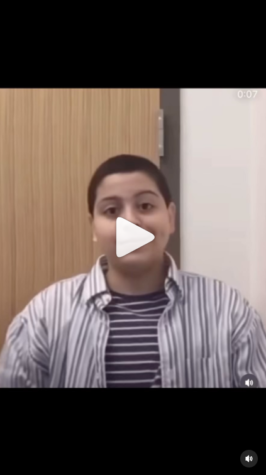
However, SF 538 – aimed at prohibiting minors from receiving transgender medical care, does not concern Pinto. His lack of concern stems from his bottom line – currently threatened by HF 9 – that transgender students have only one requirement of high school: The freedom to explore who they are.
“Sometimes you can misunderstand your identity,” Pinto said. ” I’ve had so many friends of mine that thought they were lesbian and then they were gender fluid and they were like, ‘Oh, never mind. I am just non-binary.’ That is a normal thing to happen. And it’s completely fine, but I think it’s very difficult to experience your gender identity as the opposite. If you’re not, I guess out to people, it’s very complicated to understand your own identity. Because it was very helpful for me to experience people calling me Zack, using the pronouns [he/him] for me to understand, ‘Yeah, I really do not like my dead name and going by she/her pronouns. This feels so much better’…So I think it just becomes complicated [with hormone therapy] when you’re able to not experience this as early as possible, and so laws like this where it bans, you know, basically expression of yourself without your parent’s permission it’s really damaging to a kid – not only to trans kids, but actually to cis kids as well. Because you’re just not able to express yourself fully and understand yourself fully.”
Despite the increasingly hostile Iowa legislation, Pinto said he is happier to be in the Hawkeye State than in Brazil – where when he visits, he often fears for his safety.
“…And it’s so different because you’re in America, or at least here in Ames, Iowa, I can go up to someone and be like, ‘Hey, my name is Zack. I go by he/him pronouns, or just use a pronoun pin’,” Pinto said. “When I am in Ames, Iowa, I don’t exactly fear that as much while in Brazil, I’m always like, ‘oh my god, I’m on the edge right now’…Like at the airport, I had to just pretend I wasn’t trans at all, just run along and pretend that I was just this cis woman with a quirky haircut.”
For Pinto, the U.S. is still “the land of the free”. “I see the contrast between both because I know what it’s like to be in a country where you have to hide constantly, rather than in a country where freedom of speech is allowed. And when there are laws that are being passed against you, you can just say what you want…But in Brazil, freedom of speech could literally get you killed.”
Pinto found as well that culturally, he was far more accepted as a transgender male in the U.S. than in Brazil. For his Brazillian classmates, Pinto came out as transgender through an Instagram post. While he received support, Pinto’s Instagram followers dropped from 200 to 140, most of which he noticed were Brazillian followers.
Regardless of the threat of legislative restrictions, Pinto finds faith in a community where he can seek support, “I don’t fear so much of the laws because although they’re being passed or trying to be passed, I know there’s always gonna be someone out there who cares enough to fight for it.”
Your donation will support the student journalists of Ames High School, and Iowa needs student journalists. Your contribution will allow us to cover our annual website hosting costs.
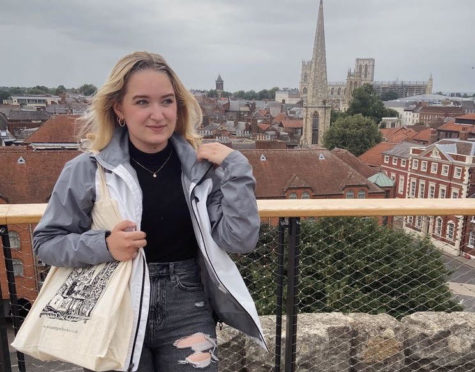
Lily is a senior who currently serves as Editor-in-Chief. On campus, she has been involved in band, pep band, and orchestra. She enjoys watching soccer...






















